‘She had shot her husband dead’: Christine Wells on the joys and pitfalls of researching historical novels
She has told the stories of a murderous royal mistress, Christian Dior’s Nazi-fighting sister and the real Miss Moneypenny. Now Christine Wells has Jackie Kennedy in her lens.

Books
Don't miss out on the headlines from Books. Followed categories will be added to My News.
Hilary Mantel once called historical fiction writers “resurrectionists”.
Our remit is to breathe life and spirit into the long-dead past, its landscapes, events, and most of all, its people. We must transport our readers into the world of our characters, speaking with an authority and with (seeming) authenticity, but without undue authorial intrusion upon the story.
A novel like this is not a history lesson, although my readers are always fascinated to learn the nuggets I manage to unearth about a particular time and place.
When Elmore Leonard said he aimed to leave out the bits people skip, he must surely have included the mini-history lecture that screams “I must tell you all about my research!” This does little to serve the reader, except as a sleeping aid or as a place to put down the book and make a refreshing cup of tea.

I love history because history is all about people, and people are endlessly fascinating. It’s almost always a person who first draws me into a particular historical period or event.
When I first found out that Christian Dior’s sister, Catherine, was a heroine of the French Resistance, I became obsessed with discovering more about her story. That obsession inspired my novel, Sisters of the Resistance.
Similarly, One Woman’s War grew out of my abiding fascination with spies. When I stumbled across the redoubtable Paddy Bennett, who was thought to be the model for Ian Fleming’s Miss Moneypenny in the James Bond novels and who took part in Operation Mincemeat, I knew I had to write about her.

In my latest release, The Paris Gown, I took three women as inspiration – Robin Dalton, the extraordinary Australian literary agent and producer to the stars; La Mère Brazier, who was the first chef ever to win three Michelin stars for each of her two restaurants; and Jacqueline Bouvier/Kennedy/Onassis, who spent her junior year of college studying at the Sorbonne in Paris before becoming first lady of the US, widowed in a world-famous assassination, and later the wife of a Greek shipping magnate.
Questions and conspiracy: The killing of John Kennedy
Whether I am writing about 1950s Paris or eighteenth-century England, I like to do as much research as I can about the place and the historical period.
That means visiting the places I’m writing about if I can, and using extant maps, sketches, paintings, photographs or video footage if it’s available to visualise what the landscape would have been like at the time my book is set.

Of course, I travel down all of the well-established avenues of research – diaries, letters, news articles, archives. I read case reports if I’m researching a particular trial, as I did for The Royal Windsor Secret, in which one of Edward VIII’s early mistresses was tried at the Old Bailey for murder. (She had shot her husband dead at the Hotel Savoy.)
Often, I write about women whose voices have been omitted from the official record, so it becomes my task to extrapolate and use my imagination to fill in the gaps.
Somewhat unconventionally, alongside more factual research, I will read novels and plays published around the time I’m writing. I will also watch contemporary movies of the time, listen to music of the era, and gaze at its art. These works give a strong sense of the mindset and preoccupations of ordinary people in that era. They also give details of everyday life which are so difficult to discover from historical records.

I don’t believe any novelist can be completely historically accurate – not many of us research what the weather was like on each day of our novel, for example – but the one thing I am pedantic about in my own work is word usage. I try my best not to allow anachronisms to creep into my prose.
I get a feel for when I’ve done enough research to start writing the book when I begin to meet facts and historical figures again and again in different contexts. Fascinating connections are made, and themes and motifs emerge. In The Royal Windsor Secret, for example, the motif that emerged from several disparate areas of research was jewellery – the artistry of its design, its symbolism and power, the way, historically, it has measured a woman’s worth.
For The Paris Gown, I had the pleasure of immersing myself in the culture, fashion, and food of 1950s Paris. (Yes, it is a hard life, being an author!) I am still working my way through La Mère Brazier’s cookbook.

Once all of this fascinating research is complete, it is time to set all of my papers aside and write the story.
As an avid reader of historical fiction myself, I know that historical novels offer what factual history books do not: an insight into the thoughts and motivations of the people who are touched by historical events, and hopefully, if the author has done her job, an absorbing and entertaining story.
The Paris Gown by Christine Wells is available now, published by HarperCollins. Join the chat about historical fiction – one of the fastest growing genres in recent years — at the Sunday Book Club group on Facebook.

Originally published as ‘She had shot her husband dead’: Christine Wells on the joys and pitfalls of researching historical novels






